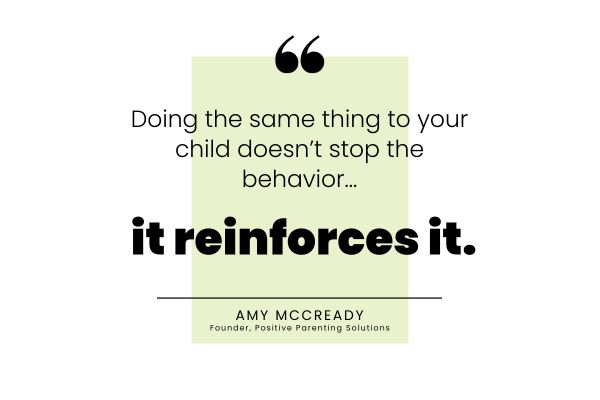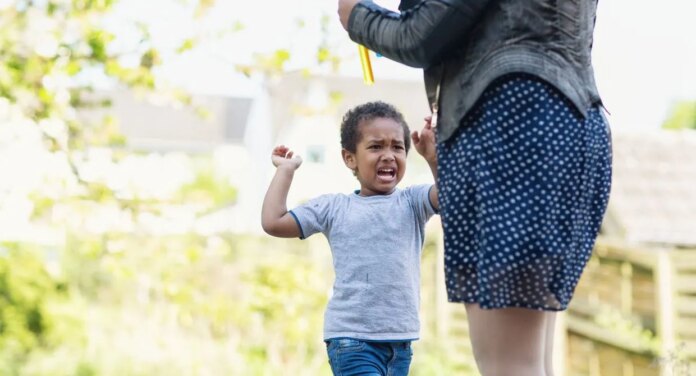It occurs immediately.
One second, you’re joyfully watching your toddler play along with his huge brother, laughing as they roughhouse throughout the ground; the subsequent, your ears are flooded along with your oldest’s screams.
Ouch! He bit me!!!
You need to consider this was a one-time-only incident. That he simply acquired caught up within the second of play. But in all honesty, this isn’t an remoted incident.
Your toddler has bitten earlier than. He’s additionally thrown a couple of fists from time to time. And you’re afraid he’ll do it once more should you don’t do one thing about it now.
Parents are understandably involved when their candy toddler turns into aggressive with different youngsters (or Mom and Dad). They surprise, Is this regular? Or, Where on earth did he choose that up from?
Throw within the added guilt of realizing their little one inflicted ache on one other particular person, and different worries begin to pop up.
Is my little one habitually aggressive? Will this cease him from making associates? Will he be a bully someday?
Though it’s a state of affairs no dad or mum needs to undergo, it’s a frequent one nonetheless.
I can’t inform you what number of exasperated and determined parents have reached out after taking my FREE PARENTING WEBINAR or enrolling within the 7-Step Parenting Success System® course with this identical concern.
Thankfully, toddler biting and hitting is never one thing to be critically involved about. Still, they’re reactions that must be nipped earlier than they flip right into a sample of habits that’s rather more difficult to appropriate.
For toddlers–or kids beneath three–biting and hitting are extra of a coaching problem than a “misbehavior.”
To a pissed off toddler with a restricted vocabulary and only a few social expertise, taking a chew from Mom or Dad’s arm or smacking a playmate who refuses to surrender a popular toy appears logical. More usually than not, there was no unwell will or malice behind the motion.
It was merely a method to an finish.
Our job as parents is to prepare our youngsters for higher habits sooner or later with out making a payoff which will trigger extra biting, hitting, or escalation.
So how will we do this?
Here are some Do’s and Don’ts to be mindful when it comes to your toddler’s hitting and biting.
Let’s begin with the issues we shouldn’t do…
Don’t Retaliate
After a hitting or biting incident, many well-intentioned parents and caregivers have had the identical thought: How will he know the way unhealthy that harm until I do it again to him?
From a excessive degree, this sounds logical sufficient. Bite the biter, hit the hitter, slap, spank, or do anything to make sure the little one is aware of how their actions made the opposite particular person really feel. But the reality is, doing the identical factor to the kid doesn’t cease the habits…it reinforces it.
While your first intuition could also be to “give him a taste of his own medicine,” perceive that toddler brains work in another way than grownup brains. Toddlers lack the reasoning expertise to totally perceive the implications of their actions.
When confronting your little one’s hitting and biting, do all the pieces you possibly can to finish the behavior of fast retaliation. This mind-set is counterproductive to stopping the aggression.

Don’t Resort to Punishment
In parenting, the road between self-discipline and punishment can appear blurry. To some, the 2 might even be used interchangeably. However, by definition, they’re not synonymous.
Dr. Jane Nelsen-the mom of Positive Discipline-described punishment as something that causes a baby to really feel blame, disgrace, or ache. It depends on utilizing detrimental emotions to finish detrimental habits, which doesn’t work.
Discipline does fairly the other. Instead of specializing in blaming, shaming, or hurting a baby to train a lesson, self-discipline trains them within the methods they ought to act. To assist your self shift from a punishment-focused mindset to a disciplinary one, strive specializing in making a teachable second.
Suppose your toddler bit her brother when he refused to share his after-school snack. In what methods can you employ this expertise to train her a greater manner to deal with her feelings and detrimental emotions? What optimistic parenting strategies can be finest to make use of?
Changing your mindset from punishment to coaching will take you far!
Don’t Label
If you’re like most parents, labeling your little one comes as second nature to you.
He’s simply such a superb baby. She’s essentially the most loving little lady on the planet! My 2-year-old can rely to 100–he’s such a genius!
And whereas that is primarily finished with nothing however a loving coronary heart, it’s equally simple for parents to label their youngsters negatively.
I swear, she’s so sassy! He’s all the time being so naughty. She’s going to be such a wild little one!
Children are complicated people going through the identical life challenges adults do…with out the life expertise to again it up. And simply as you’re greater than a dad or mum, trainer, partner, and so on., your toddler can’t be shoved right into a singular, neatly outlined field.
Discouragement abounds once we connect detrimental labels to our youngsters. These labels additionally invite judgment and criticism from others, leaving your little one at an unfair drawback.
Will the “biter” be invited to the subsequent group play date? Will the “naughty kid” obtain much less empathy or understanding from his friends and caretakers? In quick, labels perpetuate unfair stereotypes that may be laborious to overcome and restrict the optimistic connections kids could make with others.
Don’t Worry About the Opinions of Others
One of essentially the most difficult issues to overcome–for individuals of all ages–is concern over the opinions of others. But bringing that concern into the parenting realm provides a complete new degree of chaos to the combo.
While wanting to defend your public picture is pure, an unhealthy obsession with what others consider you are able to do unbelievable damage to your mental health when left unchecked. And the very last thing your already emotional and pressured little one wants is an emotional and pressured dad or mum.
Now, I get it; being often known as “the biter’s mom” or “the hitter’s dad” is mortifying, particularly after a public incident. But strive not to permit your self to be phased by the opinions of others or fear about what they could suppose or say.
Instead, maintain your focus firmly rooted in your little one.
Not solely is it extremely liberating to let go of your fear over different peoples’ opinions of you and your little one, however this will even allow you to develop stable, optimistic relationships that may assist your parenting, not hinder it.
Don’t Force Them To Apologize
For parents, it’s virtually second nature to instantly request an apology every time our kids do one thing horrible to one other. We need to train them manners and guidelines for well mannered dwelling, and this looks as if the one manner to accomplish that.
But the factor is, a compelled apology isn’t a real apology, particularly for toddlers.
Kids this younger lack an understanding of their actions’ penalties on different individuals. A compelled apology will probably be ineffective in ending the misbehavior sooner or later.
Now, that’s not to say that apologies aren’t crucial. Research shows that youngsters who sincerely apologize after a transgression construct extra belief with the particular person they harm than those that don’t apologize.
The secret’s guaranteeing that the apology is real, and that’s discovered via empathy.
True apologies contain deeper understanding and the flexibility to see from one other particular person’s perspective. This is a discovered trait and doesn’t come naturally to toddlers. That’s the place you are available!
Using easy, thoughtful language helps your little one perceive how their actions impacted the opposite particular person.
It harm Emily once you hit her. Can you keep in mind a time when somebody hit you? How did that make you’re feeling?
Forcing an apology doesn’t train empathy. But it may lead to emotions of resentment, disgrace, and judgment.
Now that we’ve talked about what you shouldn’t do when it comes to your toddler’s hitting or biting, let’s focus on what you ought to do.
Do Remain Calm & Calm Your Child
Seeing or studying about your toddler hurting one other particular person might elicit some fairly intense feelings. Embarrassment, shock, anger, harm…all are regular however do little to make it easier to stay calm.
Of course, a relaxed state is precisely the place you need to be.
Maintaining your composure fashions correct emotional regulation for your toddler and offers you time to tackle the issue from a much less emotionally charged state. Not to point out, elevating your voice is horrifying for a baby and solely escalates an already intense state of affairs.
If you’re frightened about extra aggression taking place, gently maintain your little one to stop him from doing so once more. You can examine on the opposite little one to guarantee they aren’t injured, then calmly take away your toddler from the state of affairs.

Do Take Time for Training
Once everyone seems to be calm, take time for coaching by educating your little one numerous calming strategies. You can work on belly breathing, sing a track collectively, or just give them an enormous hug to allow them to know you’re there and they’re protected.
Education is your primary precedence right here. Teaching your little one how to work via these huge feelings with out lashing out begins with you modeling the right habits.
Of course, coaching time isn’t simply for emotional regulation (although that’s positively necessary!). You can keep one step forward of any attainable triggers for energy struggles, meltdowns, and aggression just by making ready your little one to deal with these conflicts forward of time.
Here are a couple of assets we consider shall be useful to you!
Do Empathize & Explain Boundaries
More usually than not, biting and hitting are not random occurrences however end result from a surplus of massive feelings. Empathize along with your toddler to assist them determine their overwhelming feelings.
You would possibly say, “Wow, you look angry/frustrated/mad/upset. But it’s not okay to hit/bite when you are mad.” Then, actively pay attention to what they are saying, even when it’s not in phrases. More usually than not, physique language and tone can inform us excess of anything.
Next, mirror their feelings again to them by saying, “I see you’re really upset right now, and it’s okay to feel that way. What’s not okay is hurting others because of that feeling.”
Finally, finish your dialog by explaining (in phrases they will perceive) your boundaries and present them with options to select from.
“You know it’s never okay to hit/bite when you’re mad. Instead, next time, try talking to a grown-up/taking a few deep breaths/walking away.”
Do Practice the Re-Do
Everyone–adults and kids alike–wants a re-do now and then.
Pro Tip: Positive Parenting Solutions Members can evaluation Step 4, Lesson 30, for extra particulars on practising the Re-Do Tool.
After all is claimed and finished, in a relaxed second, assist your little one determine what they might do in another way subsequent time.
“Instead of hitting Zach because you wanted his truck, what could you have said to him instead?” or “Instead of biting mommy because you were frustrated, what could you have done instead?”
If your little one might re-do the state of affairs, assist them determine how to enhance it. This permits them to purchase extra constructive strategies for managing intense feelings sooner or later.
(Remember to train endurance! It will take them time to study these new habits and expertise.)
Do Practice Alternative Strategies
Let’s face it: for most toddlers, hitting and biting seem to be second nature. But battle decision expertise? Not a lot…
Yet, as parents, we frequently focus so strongly on educating our kids what they did unsuitable that we cease wanting educating them what they might have finished proper. And the factor is, that’s essentially the most essential step!
One of the most effective methods to do that is to role-play along with your toddler and present them how to deal with sure conditions!
Since you’re working with a toddler, be sure play is the point of interest. Play is crucial to toddler cognitive growth and studying. (It’s even acknowledged by the United Nations High Commission for Human Rights as a birthright for all children!) So if you would like a lesson to stick, make it enjoyable!
Try arranging a fake playdate with stuffed animals and encourage your toddler to rehearse how to deal with their frustration, search help, or specific their feelings with out hitting or biting. Just keep in mind, constant, early follow is the important thing ingredient for success.
Over time, the lesson will stick, however all they’ll care about is the enjoyable high quality time they acquired to spend with you–which will even assist lower their misbehavior!
Final Thoughts:
You might take a look at your toddler and discover it laborious to consider they’ve an aggressive bone of their cute little physique, however I can guarantee you, there’s no higher time than the early years to train them how to work via their feelings with out hurting others.
Of course, don’t fear should you really feel such as you’ve missed your window should you’re coping with aggression in older kids–it’s by no means too late to train these beneficial life expertise! Through the 7-Step Parenting Success System® course and my FREE WEBINAR, I’ve helped 1000’s of households with kids of all ages perceive the primary causes their youngsters act out with behaviors like hitting or biting.
Every day, extra and extra parents come to know what pleasure they will obtain of their households, and I’d love for your loved ones to be part of that rising record.
What You Should Do Next:
1. Subscribe to my Newsletter:
Sign up for my e-newsletter for parenting suggestions to make it easier to create a happier house and turn into the dad or mum you all the time wished to be. Plus, once you subscribe, I’ll additionally ship you a replica of our strategy-packed information 10 Tips for Better Behavior – Starting NOW!
2. Register for my FREE 60-Minute Class:
Register for my free class known as How to Get Kids to Listen, Without Nagging, Yelling or Losing Control. Classes run a number of instances per week to accommodate your busy schedule.
3. Enroll in my 7-Step Parenting Success System® Course
Enroll now in my confirmed 7-step system for busy parents prepared for change (it is rated 5 stars on Google). Plus, for a restricted time, save $100 on all plans—fully risk-free and with lifetime entry.
About the Author




